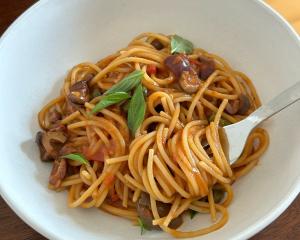
In the first of a new column, Charmian Smith sets out to investigate what is in the food we routinely pull from the supermarket shelf or buy ready made to eat.
A story to raise eyebrows (and possibly turn your stomach) appeared just after New Year. New and popular vegan pies sold in Z service stations were discovered to contain the additive E920, which is chemically extracted from poultry feathers.
Why on earth would a baker be using a product like this in pies? It's one of those stories that fuel our fears of additives used in industrially produced food, which is actually most of the food we buy in supermarkets and convenience stores, even those that claim to be healthy.
I asked Professor Phil Bremer of the University of Otago food science department to cast some light on additive E920.
E920 is L-cysteine hydrochloride, used in very small amounts in bread and other bakery products. Cysteine is an amino acid found naturally in many foods from meat and eggs to soy beans and some nuts and grains and is an essential nutrient.
However, industrial food manufacturers are not adding it as a nutrient, but as a processing aid for doughs and other products. It is one of many dough improvers, or dough conditioners as they are known in the United States, used by the baking industry to make dough easier to work with the machinery and processes it uses, to standardise its products or to extend shelf life and slow staling, according to Prof Bremer.
In pastry, L-cysteine gives better volume and helps bring the pastry back together so offcuts can be rerolled and so reduce wastage.
‘‘A lot of this is about producing products consistently to a schedule using mechanised rather than hand-made procedures,'' he said.
Whether making pies or bread, artisan bakers and home bakers spend time on mixing, fermentation and proofing so if the bread dough rises more slowly or the pie browns more quickly they can adjust the process to suit.
They and their customers are also happy to accept some variability in the finished goods.
‘‘Because bread has become commercial, consumers like it exactly the same way, weight and shape, and it's also easier for transport. When you make products at home you are far more accommodating of variations,'' he said.
However, it's the yuck factor about discovering the way L-cysteine is produced that really upsets. The majority is chemically extracted from animal sources: poultry feathers, hog hair or even, some claim, human hair.
It can also be synthesised by microbial fermentation but this is more expensive. China produces a lot of cysteine from hog hair but information on how much is produced from human hair is lacking, Prof Bremer says.
Although E920 has to be listed in the ingredients of a product, its source does not, so short of asking the manufacturer, which may then have to track down the supplier of the additive, it is impossible to tell what it comes from.
This raises problems for vegans, who eat no animal products; vegetarians, who eat no meat; and Jews and Muslims, who do not eat pork for religious reasons, and anyone who objects to eating a product containing an extract from human or hog hair or feathers, however minuscule. That's exactly what happened with the vegan pies.
Someone read the list of ingredients, brought it to the attention of the producer, which from then, to its credit, produced the pies without E920.
-By Charmian Smith












